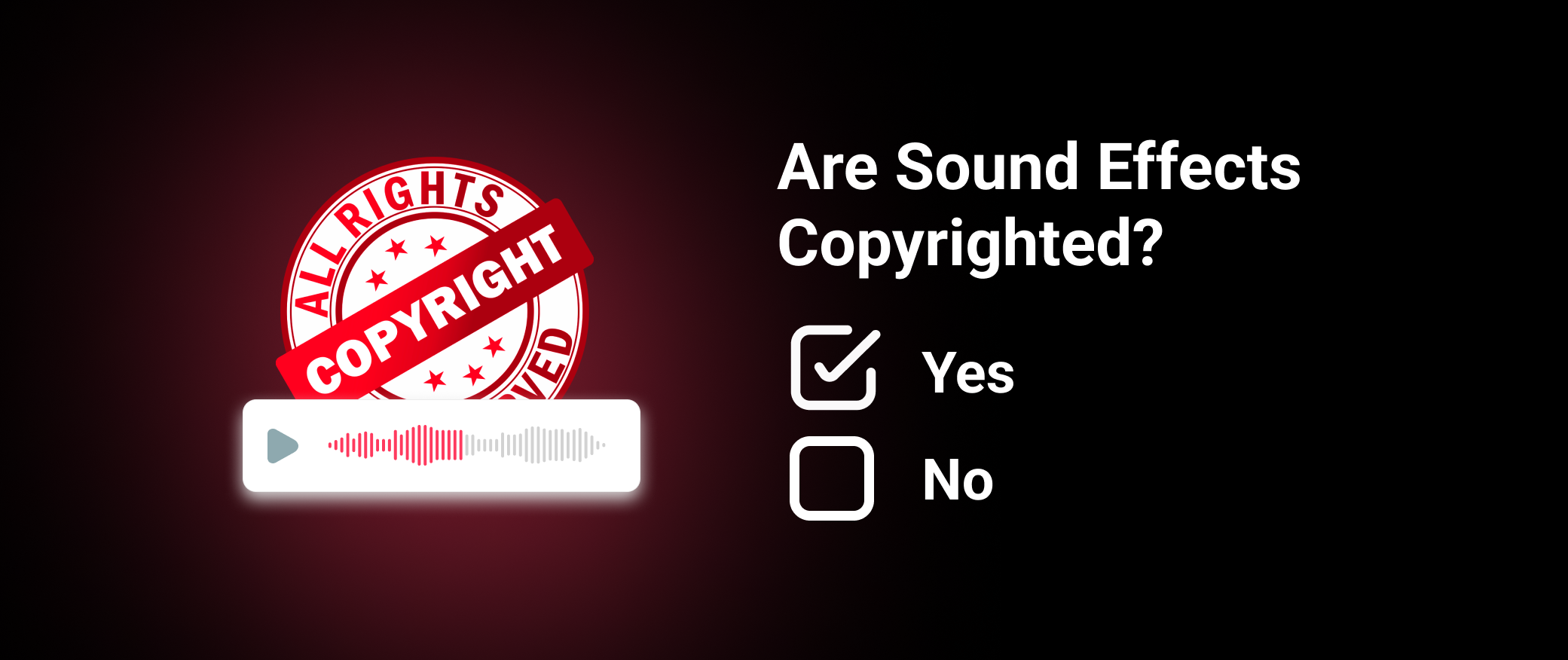Sound effects are a crucial part of the media we consume every day, from enhancing scenes in movies and TV shows to adding that extra punch to video games, video and podcasts. These small, often overlooked elements shape the landscape of the stories we watch and listen to, creating a more engaging viewer experience. But as content creators, understanding whether these sounds are copyrighted is essential to avoid potential legal issues.
So, are sound effects copyrighted, and how can you legally use them in your content? Let’s break it down.
Understanding Sound Effects and Copyright
Before we dive into the legalities, it’s important to understand what sound effects actually are. Sound effects are short audio pieces that help to emphasize or complement the visuals on-screen. As an example, think of the iconic door creak in horror films, the swoosh sound in action scenes, or the laughter you hear in sitcoms. These sounds, while often subtle, improve the viewer’s experience and help tell a story.
What Are Sound Effects?
In technical terms, sound effects are recorded or synthesized audio elements used to represent specific noises. They’re added in post-production to bring out the mood, atmosphere, and emotion of a scene. However, sound effects aren’t just random noises thrown in; they are carefully selected or produced to align perfectly with the visuals or action on the screen.
But what happens when you want to use these sounds in your own content? Are they protected under copyright?
Are Sound Effects Copyrighted?
Yes, sound effects can be copyrighted. Just like music, books, and visual art, sound effects are considered creative works, and the rights to use them are typically held by the original creator or producer. When you use copyrighted sound effects without permission, you could be infringing on those rights, leading to potential legal consequences.
Copyright laws cover both individual sounds and collections of sound effects. This means that even a short audio clip can be protected. So, whether it’s a gunshot sound or an animal roar, if the sound was created or recorded by someone else, it’s likely subject to copyright protection.
How to Know if a Sound Effect is Copyrighted
Navigating copyright law can seem tricky, but there are a few ways to find out if a sound effect is copyrighted.
• Check the Source: If you’re getting the sound effect from an online library or another platform, check the licensing terms. Many professional sound libraries clearly state whether the sound effect is copyrighted or royalty free.
• Search the Copyright Office Database: If you’re unsure about a sound effect’s copyright status, you can search through databases such as the U.S. Copyright Office or other relevant national copyright bodies.
• Use Royalty Free Platforms like Voicy: To avoid the hassle of copyright checks, you can turn to platforms like Voicy. Voicy offers a wide range of royalty free sound effects, meme clips, and music that are ready for use without worrying about copyright infringement.
Can You Legally Use Copyrighted Sound Effects?
The short answer is yes, but only with permission. There are several ways to legally use copyrighted sound effects in your content. The most common method is obtaining a sync license.
What is a Sync License?
A synchronization license, or “sync license”, grants permission to use copyrighted sound effects, music, or audio in sync with visual media such as videos, films, and advertisements. This ensures that you’re legally covered when using copyrighted sounds in your projects.
While sync licenses are commonly used in professional media production, they can be expensive and time-consuming to obtain. That’s why many content creators prefer to use royalty free sound effects from platforms like Voicy Premium, where you have access to high-quality sounds without needing to negotiate licenses or pay additional fees.
What Happens If You Use Copyrighted Sound Effects Without Permission?
Using copyrighted sound effects without proper licensing can result in serious consequences. Here are some potential risks:
• Content Removal: If your platform detects the unauthorized use of copyrighted sound effects, they may remove or block your video.
• Monetization Loss: If you’re generating revenue from your content, any earnings made from the copyrighted material could be redirected to the original rights holder.
• Legal Action: In extreme cases, you may face lawsuits, which could result in hefty fines and legal fees.
These risks highlight the importance of understanding copyright laws and securing the proper permissions before using sound effects in your content.
How to Get Sound Effects Without Copyright
Now that you know the risks of using copyrighted material, let’s look at how to legally acquire sound effects for your content.
1. Use Royalty Free Sound Effects from Voicy
The easiest way to avoid copyright issues is by using royalty free sound effects. Platforms like Voicy Premium offer a vast selection of royalty free sound effects, music, and meme sound clips that can be used without worrying about legal consequences.
With Voicy, you can download high-quality sounds that fit a variety of projects, from YouTube videos to podcasts and even video games. Plus, everything is fully licensed for commercial and personal use, meaning you can focus on your creative vision without getting bogged down by copyright concerns.
2. Public Domain Sound Effects
Another option is to search for sound effects that are in the public domain. These sounds are not subject to copyright protection, which means they are free for anyone to use. However, public domain sound effects tend to be older, of lower quality, and overused, making them less appealing for high-quality production.
3. Create Your Own Sound Effects
If you have the equipment and know-how, creating your own original sound effects is always a great option. This way, you own the full legal rights to the audio, and you can tailor the sounds to match your content perfectly. While this approach requires more time and effort, it gives you complete creative freedom.
How to Use Copyrighted Sound Effects Legally
If you absolutely must use a copyrighted sound effect, the best way to do so is by securing a music licensing agreement. Platforms like Voicy make this process easy by offering a wide range of royalty free sound effects and customizable audio clips that are perfect for content creators.
By using Voicy, you not only avoid legal headaches, but you also gain access to unique, high-quality sound effects that can elevate your content, whether you’re producing a YouTube video, podcast, or any other form of media.
Conclusion: Keep Your Creative Journey Smooth with Voicy
In today’s fast-paced digital world, sound effects play a significant role in creating engaging content. However, understanding the legal aspects of using sound effects is essential for any content creator to avoid copyright issues. By using platforms like Voicy Premium, you can access an extensive library of royalty free sound effects, music, and meme clips, ensuring your content is legally sound.
So, whether you’re a YouTuber, podcaster, or game developer, Voicy has the perfect audio for you—without the hassle of navigating complex copyright laws. Visit Voicy Premium today and unlock the power of royalty free sounds to make your content more fun and engaging!
More Articles Related to Sound Effects & Copyright
• How to avoid Copyright Strikes on YouTube
• This is how you find and use sound effects for editing your videos
• All You Need to know about the YouTube Audio Library

